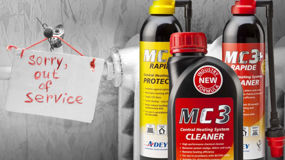How often should you power flush central heating? This depends on the material your radiators are made out of, the age and type of your boiler, and the hardness of your water. The short and generally agreed upon answer is that you should flush your radiators every 5 to 6 years. BUT, because power flushing is a way to maintain your system, you should ask a couple of questions first.
Is Power Flushing a new radiator required?
Flushing new radiators shouldn't really have to happen. It won't 'break in' your new radiator or your new system. But, finding cold spots on a new radiator might mean that your system already had some nasty corrosion/sludge in it. This may in turn have moved down to your new radiator.
In that case, your system will need flushing. If you've already power flushed the system within the last 3 years, there could be a problem with the radiator.
My Radiator Is Less Than 4 Years Old
Radiators less than 4 years old shouldn't really need flushing either. If you have nothing but mild steel radiators and live in an area with hard water, then it might be just a normal rate of corrosion.
Nonetheless, if you have stainless steel radiators with got cold spots on the bottom within 4 years of being installed, there could be an issue.
It's possible your boiler or plumbing needs replacing. Though, your plumber will be able to confirm whether you should be concerned at all.
My Radiator Is 5 Years Or Older
If you want to keep your system in tip-top shape then power flushing every 5 to 6 years is a good idea.
Still, you should be able to get away with power-flushing your radiators every 8 to 10 years depending on the quality of the materials used in your system.
How do you know if you need to Power Flush Central Heating?
Your central heating system can be though of just like a body. Imagine your boiler as the heart, the plumbing as the veins, and your radiators as the organs. It's a constant, fluid system where even small changes can indicate the beginning of trouble.
All you need to do is regularly feel the bottom of your radiators, especially if a room just isn't heating up like it should. If there are cold spots, then it's possible you have sludge in your radiator that needs flushing.
But cold spots can be as a result of a couple of other problems too.
Keep Yourself Protected
We hope you found this guide useful in helping you know how often you should power flush your central heating. If you have any further questions or problems then we want to hear from you! Get in touch with our wonderful Customer Service team who will do their utmost to help.








